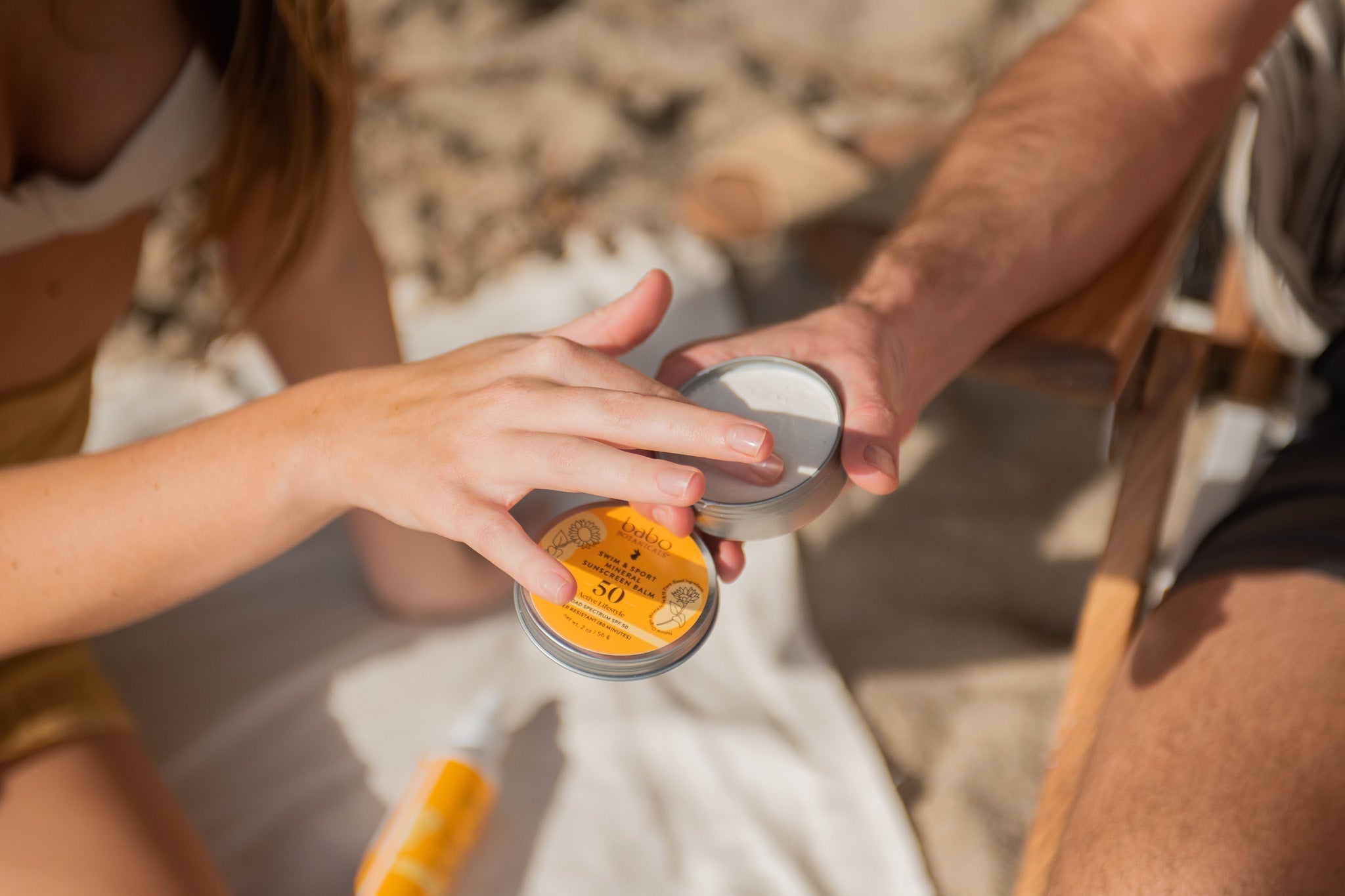
Mineral vs Chemical Sunscreen
It’s important to wear sunscreen on a daily basis, but it’s also important to wear the right type of sunscreen. There are two types of sunscreens that you can use: mineral vs. chemical sunscreen. Mineral sunscreen, or physical sunscreen as it’s sometimes called, contains the active ingredients zinc oxide or titanium dioxide. Mineral sunscreen works by reflecting UV rays off skin.
Chemical sunscreen, on the other hand, contains active ingredients that work by absorbing UV rays, converting them into heat, and then releasing that heat through the skin. Chemical sunscreens typically include ingredients like oxybenzone and avobenzone.
So, what is the best type of sunscreen to use? We’ll be discussing that–and more– in the article below.
In this article, we’ll be exploring more of the differences between mineral sunscreen vs. chemical sunscreen so you can choose the best possible sunscreen for you. To learn more about mineral vs. chemical sunscreen, continue reading this article or use the links below to skip to a section of your choice.
- What Is Chemical Sunscreen?
- What Is Mineral Sunscreen?
- Why The Right Sunscreen Matters
- Pros and Cons of Chemical and Mineral Sunscreen
- Mineral Sunscreen Tips
- Mineral Vs. Chemical Sunscreen: FAQs
- Recap: Mineral Vs. Chemical Sunscreen
What Is Chemical Sunscreen?
Chemical sunscreen is a type of sunscreen that absorbs into the skin, absorbs UV rays, and then converts those UV rays into heat and releases that heat through the body. Chemical sunscreens contain active SPF ingredients, like avobenzone, octinoxate, and oxybenzone, that offer excellent sun protection however they might not be adapted for certain types of sensitive skin, and a few chemical ingredients like Oxybenzone and Octinoxate are banned in regions like Hawaii, the US Virgin Islands and other coastal regions due to their suspected impact on the Coral Reef.
Active Ingredients
Active ingredients are the ingredients in a sunscreen that protect you from the sun. The inactive ingredients are the additional ingredients that make sunscreen moisturizing, stable, or make it smell good, among many other properties.
So what are the active, sun-fighting ingredients in chemical sunscreen? Oxybenzone, octinoxate, octisalate, avobenzone, homosalate, and octocrylene are some of them.
How Chemical Sunscreen Works
How do those active ingredients keep you from getting sunburnt? Chemical sunscreen protects your skin by absorbing the UVA and UVB rays to significantly reduce their impact on skin.
Practically, you know the drill with chemical sunscreen. You rub (or spray) it onto your skin around 15 minutes before you head outside. That gives it time to soak into your skin and be ready to effectively absorb UV rays.

Characteristics
What are some other things you need to know about chemical sunscreen?
One of the nice things about it is that it goes on relatively clear, ! it’s often easy to apply with minimal rubbing needed. But this isn’t unique to chemical sunscreens since some mineral sunscreens — like our Sheer Zinc Mineral Sunscreen Lotion SPF30 — also go on relatively clear.
However, many skin experts don’t prefer chemical sunscreens for sensitive skin, as some skin types may not tolerate them, and develop irritation or breakouts.
Some common chemical sunscreen ingredients like Oxybenzone are also suspected as potential endocrine disruptors for humans and as potentially damaging to the fragile marine ecosystems. While not all experts agree on these findings, some prefer to avoid the potential risks associated with chemical sunscreen ingredients. The state of Hawaii also instated a ban against Oxybenzone and Octinoxate starting January 1, 2021 in an effort to limit their suspected impact on Coral Reef – and the county of Maui went as far as banning all chemical sunscreen ingredients in 2022, only allowing the use of Mineral Sunscreen in the county.
What Is Mineral Sunscreen?
Mineral sunscreen, aka physical sunscreen, is another type of sunscreen that physically sits on the skin (hence the name). Mineral sunscreens work by reflecting the sun’s UV rays to provide sun protection. The main active ingredients in mineral sunscreen are zinc oxide and titanium dioxide.
Mineral sunscreens offer broad-spectrum coverage, which means they protect against UVA and UVB rays, which is ideal in a sunscreen. The ingredients in mineral sunscreen are often preferred for sensitive skin types as they are less likely to irritate skin.
Active Ingredients
There are only two active ingredients used in mineral sunscreens: zinc oxide and titanium dioxide. Some mineral sunscreens only contain one, while others contain both.
Fun fact: some sunscreens may contain a blend of chemical and mineral sunscreen active ingredients. This is when Zinc Oxide or Titanium Dioxide are used in conjunction with one or several chemical sunscreen active ingredients. This type of sunscreen is not as common and is often called a “hybrid” sunscreen.
Currently, Zinc Oxide and Titanium Dioxide are the only two sunscreen active ingredients the FDA has deemed GRASE – which stands for Generally Recognized As Safe and Effective). This means the FDA considers there is enough scientific data available to support the safety and effectiveness of these 2 ingredients.
While chemical sunscreen active ingredients are not yet considered GRASE by the FDA, it doesn’t mean they are not safe or effective. It simply means the FDA considers additional data is needed to support their safety and effectiveness and is working with chemical sunscreen manufacturers to conduct this research.
How Mineral Sunscreen Works
Mineral sunscreen sits on the surface of your skin to scatter and reflect the sun’s harmful rays.
In fact, you may hear mineral sunscreen referred to as a “physical block” since it acts like a physical barrier that keeps the sun from your skin, as opposed to a chemical reaction.
What about applying mineral sunscreen? While you should always apply your sunscreen 15 minutes before exposure, mineral sunscreen tend to offer more immediate protection because their mode of action doesn’t require for them to penetrate skin to be activated.
Characteristics
Typically, one of the big complaints about mineral sunscreens is that it leaves your skin white when you put it on. That’s a legitimate concern!
The good news is that, like we mentioned earlier, some mineral sunscreens (Sheer Zinc Mineral Sunscreen Lotion SPF, for example) go on relatively clear!
A couple of other characteristics that make mineral sunscreen stand out is that the active mineral ingredients are less like to irritate for sensitive skin aone of the reasons they often receive higher and get better ratings with third-party organizations like the EWG (Environmental Working Group). It’s also why the AAD (American Association of Dermatology) recommends choosing mineral sunscreen if you have sensitive skin (source: https://www.aad.org/media/stats-sunscreen)
Plus, many mineral sunscreens that are dermatologist tested and fragrance-free.
Finally, zinc oxide offers broad spectrum of protection, meaning it is able to protect your skin against both UVA and UVB rays.
Titanium dioxide does a good job against UVB rays out, but it’s not as effective when it comes to UVA rays. That’s why Titanium Dioxide is most often used in conjunction with Zinc Oxide, while Zinc Oxide is often used on its own. Pros And Cons Of Chemical And Mineral Sunscreen
If you’re struggling to make a decision between mineral or chemical sunscreen, sometimes it helps to make a pros and cons list. Here’s ours!
Pros Of Chemical Sunscreen
- Quick and easy to apply
- Generally doesn’t leave a white film on the skin after application
Cons of Chemical Sunscreen
- Chemical sunscreen active ingredients are more likely to cause skin irritation or cause breakouts in some people, particularly those with sensitive skin
- They require a bit more time to be activated once applied on skin, as their mode of action requires for them to penetrate into skin.
- Some chemical sunscreen active ingredients are suspected as potential endocrine disruptors, although research is not entirely conclusive.
- Some chemical sunscreen active ingredients are banned in certain coastal regions, requiring for consumers to make sure they are familiar with local regulation before packing their favorite sunscreen.
Pros of Mineral Sunscreen
- Since there are only two active ingredients used to create mineral sunscreen, this makes it ideal for people with sensitive skin — and the whole family
- The gentle nature of mineral sunscreen is often preferred for babies and pregnant women
- Their mode of action doesn’t require for them to penetrate skin to be activated, so you’ll get slightly faster protection if you forgot to apply your sunscreen ahead of sun exposure.
- Mineral sunscreens are not banned in any specific state or region, making it an easy choice when travelling
Cons of Mineral Sunscreen
- Many mineral sunscreens on the market tend to be thicker and leave a white film on your skin, so you might need to rub it in a little longer. (Babo Botanicals Sheer Zinc Sunscreen is light, clear, and leaves minimal white cast, so you don’t have to worry about that!)
- There is less variety of textures available with mineral sunscreen as the active ingredients are opaque, making them incompatible for clear formulas like sunscreen oils, clear sprays or gels.
- The higher SPF available is usually SPF50 with mineral sunscreen as there aren’t as many mineral filters as there are chemical filters ; however it’s important to note that an SPF50 already protects against 98% of UV rays, so anything above SPF50 only adds small marginal protection.
There are so many ingredients that can be found in skincare products that may not be appropriate for your skin type that it’s important to research the products you use.
Mineral Sunscreen Tips
For those of us here at Babo Botanicals, there’s no question: mineral sunscreen is our favorite, hands down!
We like the idea of high-quality, effective sun protection that also keeps our bodies healthy and happy.
If you’ve decided to go this route as well, here are a few tips and reminders.
1) Choose Sheer Zinc Sunscreen
Choosing to use mineral sunscreen doesn’t automatically mean you have to sacrifice your looks. If you’re hesitant to use mineral sunscreen because you’re afraid it’ll leave a white cast on your skin, Babo Botanicals will be your best friend.
Babo Botanicals’ Sheer Zinc Sunscreen uses Clear Skin, a type of Zinc Oxide that goes on clear and is very easy to rub in, so you don’t have to worry about being left with that white cast. It’s also dermatologist tested and fragrance-free for those of you with sensitive skin. That’s a win all around!
2) Check Your Daily Sunscreen
You probably put extra thought into sunscreen during the summer months, but don’t forget to check the ingredients of the sunscreen or foundation you wear on your face every day. Any product you use on a daily basis should contain ingredients that are adapted to your skin type! And that includes using a safe sunscreen on your face.
If you’re looking for a daily sunscreen using mineral active ingredients, check out our Daily Sheer Tinted Facial Mineral Sunscreen
3) Reapply Every Two Hours
Just like with chemical sunscreen, with mineral sunscreen, you’ll need to reapply every couple of hours, especially if you’ve been in and out of the water.
You should reapply sunscreen every two hours, and even more often if you’ve been swimming or sweating. If you don’t reapply your sunscreen often, you’re risking exposing yourself to harmful UV rays. It’s not worth the risk. Just remember to reapply every two hours.
For easy reapplication and 80 minutes of water and sweat resistance, use Babo Botanicals’s Sheer Zinc Mineral Sunscreen Spray.
4) Don’t Forget Your Lips
Don’t leave any body part left behind when it comes to sun protection! That includes the tops of your feet and ears, those hard-to-reach spots, and, of course, your lips. There’s nothing more painful than sunburnt lips, so give your pout some extra TLC.
Protect and pamper your lips with our Mineral Sunscreen Stick SPF50. Do it daily for smooth, soft lips!
Mineral Vs. Chemical Sunscreen: FAQs
Are Mineral Sunscreens Better Than Chemical Sunscreens?
When choosing between mineral vs. chemical SPF, we say go mineral every time. Mineral sunscreen is made with titanium dioxide and zinc oxide, which are preferred by dermatologists for those with sensitive skin. It’s important to choose a sunscreen that contains ingredients that are less likely to irritate your skin, which is exactly why you should choose mineral sunscreen.
Why Are Chemical Sunscreens Bad?
Chemical sunscreens aren’t necessarily bad, but they can contain harmful ingredients that are more likely to irritate the skin. These ingredients are also more likely to cause breakouts, so it’s not ideal for people with sensitive skin.
Chemical sunscreens work by absorbing into your skin, which is why some chemical sunscreen active ingredients are suspected to be potential endocrine disruptors (but again, the research is not entirely conclusive on this point).
Also, some chemical sunscreen ingredients are banned in Hawaii and other coastal regions in an effort to protect the fragile marine ecosystem. If you’re looking for sunscreens that are vetted by an independent third party organization, you can also look at the EWG sunscreen guide for more insight.
Does Mineral Sunscreen Last Longer Than Chemical Sunscreen?
Both mineral sunscreen and chemical sunscreen provide sun protection for the same amount of time. Regardless of the type of sunscreen that you use, you should always reapply every two hours in order to get full protection for the whole day, or immediately after swimming or sweating.
Does Mineral Sunscreen Leave A White Cast?
Some mineral sunscreens will leave a white cast on your skin, but Babo Botanicals’ offers a wide range of options to help you find the mineral sunscreen that will work best for your skin.
Recap: Mineral Vs. Chemical Sunscreen

When deciding between mineral vs. chemical sunscreen, we’ll always recommend mineral sunscreen. But at the end of the day, the best sunscreen is the only you’ll want to use and reapply regularly
Babo Botanicals carries a variety of mineral sunscreen products, like a sheer mineral sunscreen spray and a sheer mineral sunscreen lotion, that are made with plant-based, natural ingredients. All of our mineral sunscreen products are formulated to provide excellent sun protection, and they are all dermatologist tested and fragrance-free to work well on all skin types, including sensitive skin.





